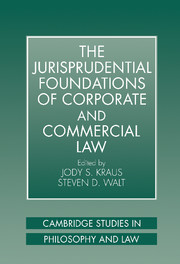Book contents
- Frontmatter
- Contents
- Contributors
- Introduction
- 1 Karl Llewellyn and the Origins of Contract Theory
- 2 Economic Efficiency and the Ex Ante Perspective
- 3 Constrained Optimization: Corporate Law and the Maximization of Social Welfare
- 4 Do Trade Customs Exist?
- 5 The Uniformity Norm in Commercial Law: A Comparative Analysis of Common Law and Code Methodologies
- 6 In Defense of the Incorporation Strategy
- Index
4 - Do Trade Customs Exist?
Published online by Cambridge University Press: 22 September 2009
- Frontmatter
- Contents
- Contributors
- Introduction
- 1 Karl Llewellyn and the Origins of Contract Theory
- 2 Economic Efficiency and the Ex Ante Perspective
- 3 Constrained Optimization: Corporate Law and the Maximization of Social Welfare
- 4 Do Trade Customs Exist?
- 5 The Uniformity Norm in Commercial Law: A Comparative Analysis of Common Law and Code Methodologies
- 6 In Defense of the Incorporation Strategy
- Index
Summary
Introduction
The question, of course, is semifacetious. Trade customs – and related concepts such as trade usage, course of dealing, and course of performance – play a central role in Article 2 of the Uniform Commercial Code. They played an equally important role in the work of Karl Llewellyn, one of Article 2's principal drafters. Customs are also invoked, at least occasionally, in analyses of corporate law. And there is surely some sense in which trade customs actually do exist.
Nevertheless, I argue here that the exact sense in which customs exist deserves closer examination. Customs can be thought of as a kind of pattern or regularity in prior behavior, much as common law doctrines can be thought of as a pattern or regularity in court decisions. In jurisprudence, however, it would be controversial to claim that patterns in court decisions have an existence of their own, or that those patterns can be identified independently of the goals and beliefs of the person doing the identifying. In this paper, I argue that the existence (and identification) of customs should be subject to exactly the same controversy. In particular, I suggest that the goals, beliefs, and other normative premises of the person doing the identifying must inevitably play a role in the interpretation and application of customs.
Part II of this chapter defines the issue more precisely by distinguishing it from much of the recent literature on norms and customs in commercial law.
- Type
- Chapter
- Information
- The Jurisprudential Foundations of Corporate and Commercial Law , pp. 118 - 148Publisher: Cambridge University PressPrint publication year: 2000
- 1
- Cited by

